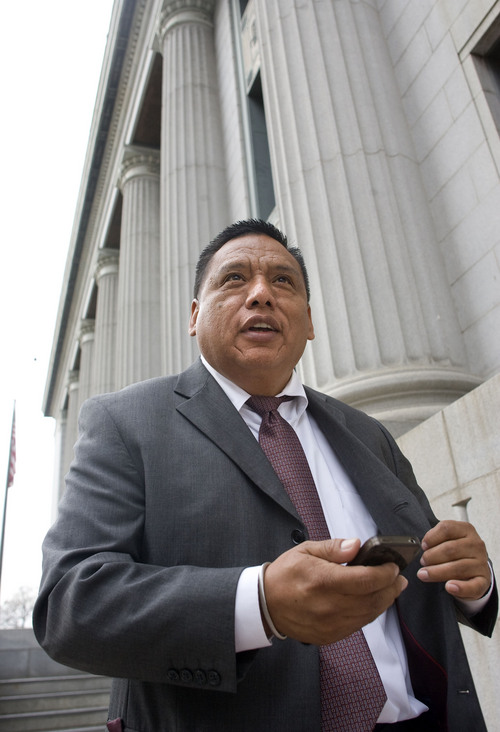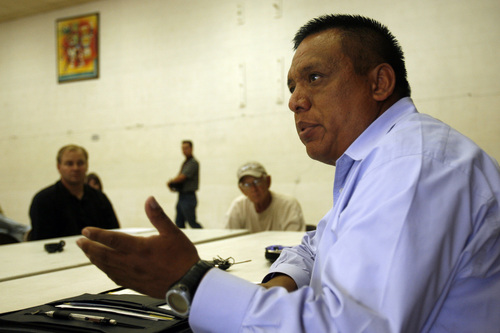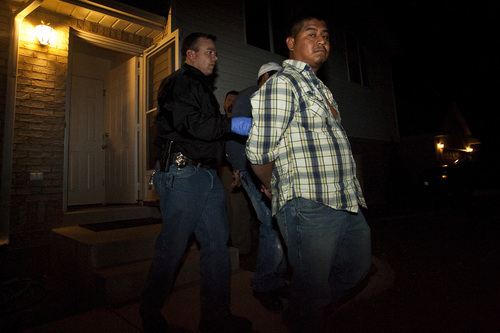This is an archived article that was published on sltrib.com in 2014, and information in the article may be outdated. It is provided only for personal research purposes and may not be reprinted.
The ultimatum was as harsh as it was ineffective: Testify or face deportation.
It was no way to persuade a scared undocumented immigrant to testify about how Victor Manuel Rax sexually abused him and other boys, manipulated them into selling drugs at Utah high schools and threatened to kill their families to keep them quiet.
"Deport me to hell," the boy, fearing for his family, allegedly told investigators.
He was not alone. For years, Rax and criminals like him evaded capture because their victims were as afraid of law enforcement as they were of their tormentors.
It's a widespread problem among the estimated 110,000 undocumented immigrants in Utah: Criminals target them, and police find it difficult to do much about it because immigrants worry they'll be deported.
Some agencies, prosecutors and even immigration officials are working to ease that fear by promising victims immunity and anonymity and working to allow them to stay in the country. But those promises sometimes come with strings or loopholes, fueling old worries that law enforcement isn't to be trusted.
The case against Rax, 42, who was eventually arrested and charged before committing suicide in jail late last month, has served as an example of what can go right when law-enforcement agencies earn their way into the immigrant community through trust rather than fear.
—
Years in the making • Rax had been on investigators' radar since 2009.
That's when allegations of sexual abuse and threats began to surface. But victims were afraid to talk to local police agencies and investigations stalled.
For several years the state's SECURE Strike Force on immigrant crime had worked to build inroads into the immigrant community, beginning in school gymnasiums and lunchrooms, civic gatherings, churches and libraries.
"We would go anywhere they would allow us to speak," said Leo Lucey, a section chief at the attorney general's office who helps oversee the strike force. "We wanted to have the conversation with people that this is only going to work if the community is willing to come forward and talk to law enforcement."
At first, few were. But case by case, the trust grew.
Tony Yapias, director of Proyecto Latino, has worked as a go-between for victims and police.
He recalled his first encounter with the strike force: It was the case of Jose Gonzalez, who was ultimately convicted of impersonating a U.S. Immigration and Customs Enforcement (ICE) officer and extorting and threatening victims.
"At first [the victims] said, 'We absolutely don't want to talk to anybody about it. We don't want to get deported.' "
But when one victim — crying and shaking — begged him for help, Yapias decided to approach the strike force.
He received assurances the team wouldn't seek deportations. Yapias took the word back to the community. They set up a meeting. Fifteen victims showed up.
The strike force has similarly worked with clergy and the Mexican Consulate to build trust, officials said, and has followed through with promises for victim protection.
"We aren't an extension of ICE or immigration," Lucey said. "The vast majority of our cases come from victims and witnesses who step forward — and the vast majority of them are illegal immigrants."
It wasn't until this year that the strike force began to make strides in the Rax case, and the relationship it had forged with community leaders — including Yapias — was key.
When word spread that police were seeking help to prosecute Rax, "Ignacio" contacted Yapias because he knew and trusted him.
Ignacio says his stepson became involved with Rax, disappearing with him for days at a time and hiding his activities because he was threatened into submission.
Rax showed the boy "they have a lot of guns, a lot of people, and can do bad things to his family," said Ignacio, who The Salt Lake Tribune agreed not to identify.
After assuring Ignacio that he trusted the strike force, Yapias put him in contact with officers.
Clergy members did the same for other victims.
Eventually, droves of witnesses came forward with tales of horrific abuse and intimidation.
—
Abuse, threats • One witness told police that Rax had "black magic" and spoke in tongues to a god he called "Santa Muerte" — the saint of death. He also allegedly drugged some boys until they were unconscious and then sexually assaulted them.
Rax and his brother were arrested Feb. 12 and Rax was ultimately charged in 3rd District Court with 63 felonies ranging from sodomy on a child to human trafficking to drugs. Investigators believe he raped children as young as 9 and threatened their families — with violence and deportation — to force them to sell drugs and submit to abuse.
Police identified 16 of the victims, according to the attorney general's office.
"Every single victim we encountered ended up cooperating," Lucey said. "Had many of those victims not been brave enough to come forward, many of them with a lot to lose by coming forward, we would not have been able to prosecute this case."
Rax's brother, Alfredo Rax, 35, was charged with tampering with a witness and retaliation against a witness, both third-degree felonies, for allegedly approaching witnesses in this case and telling them they would be "taken care of financially" if they refused to testify, and that they would "regret it" if they cooperated.
When Victor Manuel Rax was found dead April 28, having hanged himself inside a solitary cell, Attorney General Sean Reyes said not bringing him to trial would spare his child victims the "trauma of testifying in criminal court proceedings."
"While his guilt or innocence will now never be proven through the justice system," Reyes said, "if he was guilty, as we alleged, then we are comforted that many children and their families will live in fear no more."
Perhaps not of Rax, officials say, but these crimes — of extortion, manipulation and abuse of undocumented immigrants — happen daily.
"It happens all the time," Lucey said. "Every day, there are more victims out there who are being taken advantage of because of their immigration status. Because people know that these victims are less likely to come forward, to cooperate. Because they're afraid."
Ignacio says the Rax case has made a big difference in the minds of immigrants.
"I would tell others now: Don't be afraid of going to the police."
—
New approach • The newer notion that victims of serious crime should be helped — not punished — regardless of their immigration status was apparent at a news conference earlier this year when some enforcement agencies discussed their desire to stop immigration scams.
"We're not going to punish them for being a victim. We want to help them," said Jeanne M. Kent, Salt Lake City field office director for U.S. Citizenship and Immigration Services.
John Huber, a prosecutor for the U.S. attorney for Utah, added, "What motivates a prosecutor is when you have a vulnerable community with predators amongst them taking advantage of them," and it is those predators they want to catch, not victims.
Andrew Muñoz, spokesman for ICE, provided an agency handbook detailing tools available to forestall removal of crime victims who are undocumented immigrants.
Options offered include a "U visa" to allow victims to remain in the country. But it has some caveats.
It is available for up to 10,000 victims nationwide a year "who have suffered substantial mental or physical abuse as a result of criminal activity and are willing to help law enforcement."
Of course, not all crimes targeting immigrants may cause "substantial abuse."
Yapias says the most common crime against immigrants is extortion. In its simplest form, this can be an employer refusing to pay a worker who feels powerless to protest.
Another example, he says, is an immigrant who saved $80,000 to buy a restaurant franchise — and the recipient simply stole the money. "She told him to go away or I will report you to immigration."
The ICE handbook gives a list of the types of crimes that could qualify for a U visa.
They include rape, torture, trafficking and prostitution, although blackmail, extortion and domestic violence are also listed.
Yapias says he has seen U visas given to Utah residents, but rarely, and only in big cases involving the worst crimes.
"What is mostly ignored in the community are the small, individual victims that happen everyday. Nothing happens for them."
If a victim does not qualify for a U visa — or a "T visa" for victims of human trafficking — the ICE handbook says it can offer not to deport them, but advises that decision is "purely discretionary."
Among factors ICE will consider, it says, are an individual's criminal history, "national security implications, the likelihood of removal, the presence of sympathetic factors favoring the alien's case; and/or whether a law enforcement agency desires a person's presence for an ongoing investigation or prosecution."
ICE also warns that deferred action "may be terminated at any time."
It's a gaping loophole that doesn't inspire great confidence among immigrants.
"I wish other law enforcement would learn something from the strike force in terms of how they work with victims," Yapias said.
"Not all departments work like that. There's still a lot of distrust [among the immigrant community] with some police departments."
ldavidson@sltrib.com, mlang@sltrib.com Twitter: @LeeHDavidson, @Marissa_Jae







